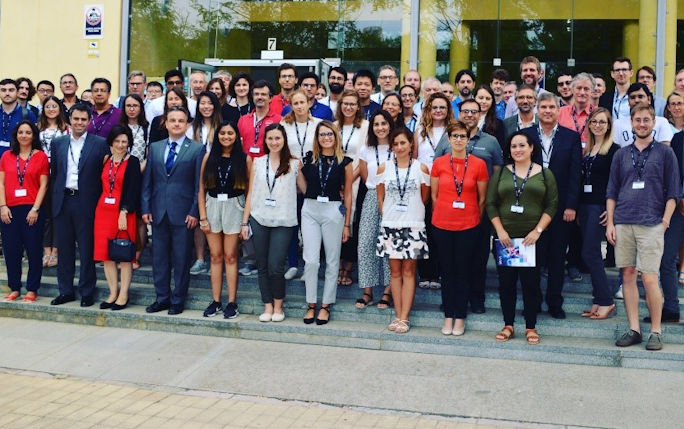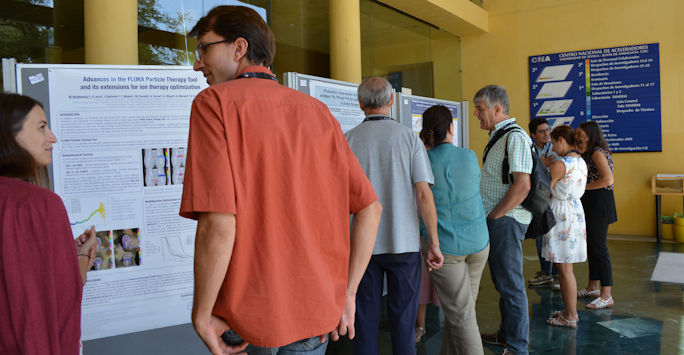International Conference on Medical Accelerators and Particle Therapy held in Seville

The Liverpool-led Marie Curie Innovative Training Network OMA – Optimization of Medical Accelerators - has held its final official event in the form of an International Conference on Medical Accelerators and Particle Therapy. The conference took place from 4-6 September 2019 at the headquarters of one of the project partners, the Centro Nacional de Aceleradores (CNA) in Seville, (Spain).
This international event was an ideal place to present and discuss OMA research outcomes, including diagnostics for beam and patient monitoring, treatment planning, as well as medical facility and beam line design and optimization. The conference featured invited talks from research leaders, contributed talks and poster contributions. More than 70 delegates from all around the world participated in the event.
Following the very successful conferences held within the framework of the earlier DITANET and oPAC projects, Seville offered once again a perfect environment to discuss the latest research advances. The event was started with a welcome address by Margarita Paneque Sosa, Institutional Delegate of CSIC in Andalusia, Patricia Aparicio Fernández, Director of the Secretariat of Research Centres, Institutes and Services of the University of Seville and Jose María López Gutiérrez, Deputy Director of the CNA.
OMA Coordinator and Head of our Physics Department Carsten Welsch then gave an overview of the network and wider context in which it is placed. He talked about the research challenges that the OMA Fellows are addressing across the three scientific work packages, as well as the unique approach to researcher training taken by the consortium.
Professor Welsch said: “I am delighted that our conference attracted a number of high profile speakers, such as IBA founder Yves Jongen who presented a fascinating outlook on next-generation therapy accelerators and the opportunities different technologies can offer. “
Other invited speakers included Katia Parodi/LMU (in-patient beam imaging), Michele Caldara/ADAM (beam diagnostics), Tony Lomax/PSI (Dose delivery), Antonio Lallena (Monte Carlo Dosimetry), Simon Marcelis (Dosimetry and QA) and Guido Baroni (4D patient monitoring). They were joined by the OMA Fellows who presented a summary of their research projects, and other delegates who contributed talks to the conference. This gave an interesting programme and included many hot topics, such as FLASH therapy. A poster session on the Thursday afternoon allowed further discussions between delegates. All participants were invited to contribute an article about their research to the conference proceedings, which will be published in the European Journal of Medical Physics.

Image: Lively discussions during the afternoon poster session.
In order to raise more awareness of the importance of accelerators for science and society the conference also sponsored an outreach talk, especially addressed to the Spanish public, about the treatment of cancer with particle accelerators. The talk, given by Professor María Isabel Gallardo, from the University of Seville, reviewed the history of radiotherapy, the physical principles of their efficacy in diagnosing and treating cancer, and the future prospects of radiological techniques. Professor Gallardo highlighted the hope offered by accelerators of a definitive cure for cancer, if only the necessary investments where made in facilities for ion therapy. The talk was attended by a large group from the general public, as well as students, who showed their interest in the topic by actively engaging in many questions.
Professor Welsch added: “OMA has been a fascinating journey for all of us. It makes me incredibly proud to see the excellent research results of our Fellows here at this conference. They have followed a unique training programme, which I am sure will provide them with an excellent basis for their future careers. Medical accelerators is an exciting area of research and our research helps save lives and improve cancer therapy.”
The University of Liverpool has had a lead role in the training of postgraduate researchers by initiating and coordinating no less than five innovative training networks in accelerator R&D over the past decade. These initiatives have trained around 100 experts in this multidisciplinary field and have put Liverpool in the center of an international effort.
More information about the conference and all talks can be found on the conference web page. The network is much obliged to CNA for hosting the conference and to all our Fellows who contributed to the success of the event.
